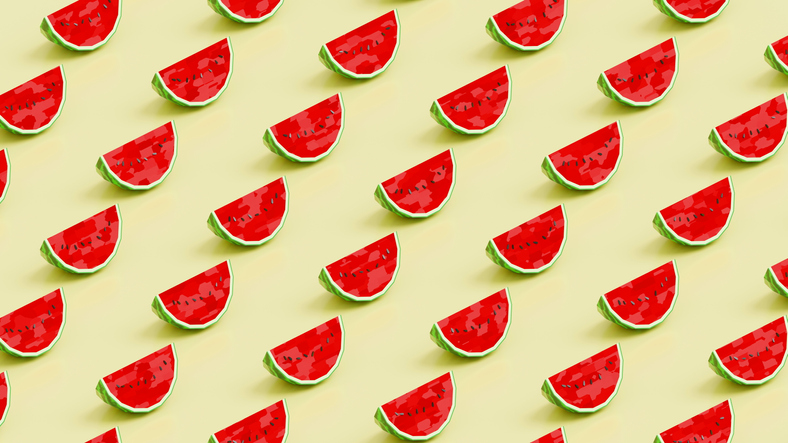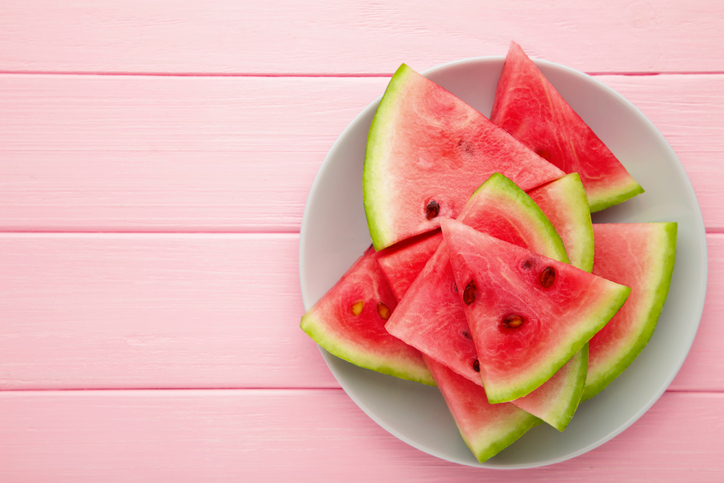If It Ain’t Broke, Don’t Fix It! Watermelon Is Delicious & Healthy Just As It Is

By Joy Stephenson-Laws, J.D., Founder
Just when I think I’ve seen it all, I come across stories such as the following. Apparently, popular pizza chain Domino’s attempted to create a watermelon pizza that actually tastes good. Yes, you read that correctly, and not surprisingly they failed!
Watermelon has been quite the popular food lately on social media. For example, there was a recent TikTok trend where people were putting mustard on watermelon and eating it. Even Lizzo tried it. Again, unsurprisingly she did not find it very appetizing.
I’m not sure why people are interested in “messing with” some of the most delicious foods nature has to offer. As the saying goes: “If It Ain’t Broke, Don’t Fix It!”
I’m all for eating watermelon, but having it simply cut into slices is enough for me. It’s delicious and hydrating just as it comes. I have also more than once previously blogged about the benefits of eating watermelon. I think it is worth revisiting this subject as watermelon is a popular end of summer treat at parties and BBQs.

Watermelon is rich in minerals.
Minerals are, in many ways, the unheralded and often forgotten heroes of keeping our bodies functioning at their best. While the nutrients, carbohydrates, proteins and fats may be better well known, minerals are equally vital for helping us get and stay healthy.
This fruit is rich in the minerals potassium and magnesium. Potassium works with sodium to balance the fluid and electrolytes in the body. Potassium also helps keep blood pressure under control and may help reduce kidney stones and bone loss as you age. It may even reduce your risk of stroke. Most adults need about 4,700 mg of potassium per day. Just two wedges of watermelon have 640 mg of potassium (watermelon is richer in potassium than bananas are).
Magnesium is a mineral that is an important cofactor for hundreds of processes and reactions in the body, including energy. It is important in sugar breakdown and use, blood pressure regulation and muscle and nerve function, including function of the heart muscle. There is even evidence that magnesium improves the symptoms associated with depression. It may even help you get better sleep.
Watermelon is also rich in vitamins.
You will also find powerhouse antioxidants vitamins A and C in watermelon. Vitamin A may help maintain healthy vision, especially as you age. Vitamin A also reportedly maintains healthy skin and helps with neurological and reproductive function.
Vitamin C is very key to a healthy diet. Vitamin C protects the immune system from deficiencies that may lead to cardiovascular illnesses and other diseases. It is one of the most important nutrients needed for our survival. As mentioned it is also an antioxidant, which means it protects our bodies from free radicals and other harmful molecules. It is a major producer of collagen, which is the main ingredient behind the repair of bone and skin tissue, cartilage, ligaments, tendons and teeth. Vitamin C also helps moisturize and nourish the skin, which may increase skin elasticity and may even restore a youthful appearance. It also helps prevent scurvy.
Vitamins B1 (thiamine), B5 (pantothenic acid) and B6 (pyridoxine) are also present in watermelon. To learn more about the benefits of these vitamins, check out this pH Labs blog.
Watermelon is low in calories and very hydrating (hence the name).
“You get all of that [as in all of the vitamins and minerals] for only 46.5 calories per cup,” according to this Medical Xpress report that discusses the health benefits of eating watermelon.
Furthermore, “Befitting its name, watermelon is about 92% water, which suggests why ancestral watermelons were carried in Africa's Kalahari Desert as long as 5,000 years ago.”
Watermelon is a good source of three other antioxidants you should know: lycopene, glutathione and l-citrulline.
Lycopene is a great anti-inflammatory and may even reduce the risk of stroke, according to the Medical Xpress report. Glutathione does so much for the human body, which I discuss in great detail here. And for information about l-citrulline, check out this blog. Heads up, if you are an athlete or very physically active person you definitely may want to consider having watermelon as a pre or post workout snack.
Watermelon has sugar, but not sugar that you need to fear.“Even though it has natural sugar and a high glycemic index—a measure of how fast sugar enters the bloodstream—it has a low glycemic load. That means its actual effect on blood sugar is small. And it will fill you up faster than, say, a bowl of cookies,” according to the Medical Xpress report.
A guilt-free, sugary snack. Sign me up!
Want to spruce up your watermelon?
I wouldn’t suggest a watermelon pizza or putting mustard on this beautiful fruit, but if plain old watermelon wedges bore you might I suggest making a watermelon salsa, watermelon and feta salad, watermelon smoothie or these healthy watermelon popsicles.
As always, if you are taking any medications or have any health concerns, it is advised to seek the advice of a competent healthcare professional regarding what foods you are including in your daily diet.
Enjoy your healthy life and happy Labor Day!
Disclaimer: This article is not intended to provide medical advice. Please consult with your doctor or another competent healthcare practitioner to get specific medical advice for your situation.
The pH professional health care team includes recognized experts from a variety of health care and related disciplines, including physicians, attorneys, nutritionists, nurses and certified fitness instructors. This team also includes the members of the pH Medical Advisory Board, which constantly monitors all pH programs, products and services. To learn more about the pH Medical Advisory Board, click here.







